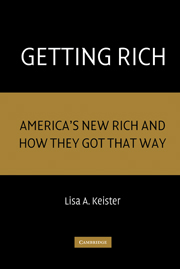Book contents
7 - Work and Occupations
Published online by Cambridge University Press: 05 June 2012
Summary
Individual behaviors and processes naturally affect wealth accumulation and mobility apart from the effects of family and family background that have been the subject of the past two chapters. However, the nature of the relationship between individual actions and wealth accumulation can be complex. In this chapter, I focus on the portions of the conceptual model (Figure 4.1) that relate to individuals and their work experiences. Figure 7.1 highlights the portion of the full conceptual model that is the focus of this chapter. The highlighted portions of the model include adult work experiences and job characteristics. I have also highlighted the portion of the model that includes individual traits such as ability, ambition, and early-life behaviors. The focus of the chapter is work and occupational effects on wealth, but I do discuss some individual inputs in the chapter's final section. My objective is to demonstrate how my conceptual model works. Moreover, there is not enough room in a single chapter to explore each of these factors in depth, even though the analyses I present later in the chapter include indicators of as many of these factors as possible
THE IMPORTANCE OF WORK AND JOBS
Rather than discussing all individual traits that shape wealth accumulation and mobility, I concentrate on elements of work behavior that affect adult wealth. I ask whether there are occupational differences in wealth ownership and what factors account for patterns that emerge.
- Type
- Chapter
- Information
- Getting RichAmerica's New Rich and How They Got That Way, pp. 173 - 208Publisher: Cambridge University PressPrint publication year: 2005



